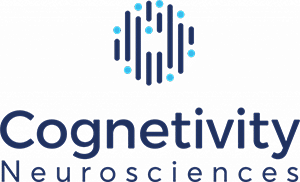Cognetivity Neurosciences Selected to Present New Landmark Research Data at the 14th International Conference on Alzheimer’s and Parkinson’s Diseases in Lisbon, Portugal
VANCOUVER, March 27, 2019 /CNW/ – Cognetivity Neurosciences Ltd. (the “Company” or “Cognetivity”) (CSE: CGN; FWB:1UB; OTCQB: CGNSF) announced that it has been selected to present new, landmark results from its ongoing research into the use of the company’s Integrated Cognitive Assessment platform for the detection of early stage cognitive impairment at the 14th international Conference on Alzheimer’s and Parkinson’s, March 26-31, Centro de Congressos de Lisboa, Lisbon, Portugal.
In posters titled ‘Employing machine learning in the development of a self-administered, computerised cognitive assessment battery for the assessment of neurodegeneration‘ and “A brief language-independent and self-administered computerized test for cognitive assessment in multiple sclerosis“, Cognetivity’s Chief Medical Officer, Dr. Chris Kalafatis will present compelling new data from ongoing studies involving the company’s unique AI-based approach which show positive results from trials into the effectiveness of its proprietary Integrated Cognitive Assessment (ICA) platform for early detection of neurodegeneration.
Notable among the research data to be included in the presentation is a strong correlation between levels of blood plasma neurofilament light* (NfL) and ICA score. The highly significant correlation of 0.79 clearly demonstrates the ICA’s ability to predict the presence of neuronal damage using software only.
This correlation gives further validation of the ICA test as a reliable, yet non-invasive, measure of cognitive impairment caused by damage to nerve cells. Blood plasma biomarkers such as NfL have potential to be effective as a diagnostic procedure for clinicians, but these procedures are invasive and highly time consuming.
Cognetivity’s 5 minute ICA test which is highly cost efficient, sensitive, provides instant results and has an ability to predict actual neuronal damage represents a significant step towards a potential future where effective screening for conditions that involve damage to brain cells – such as MS or Alzheimer’s disease – in large populations could be administered at considerable scale via the use of Cognetivity’s software delivered through existing technology such as tablet computers and smartphones.
The results also make a strong case for the ICA’s suitability for use in clinical studies into new drugs to treat diseases such as Alzheimers’, where the often subtle effects of therapeutic candidates on cognition can be hard to detect, particularly given the severe limitations of current standard cognitive tests used in these studies.
Other results that will be included in the presentation are:
- Information on ongoing studies using the ICA, highlighting its speed and ease of use, and its suitability as a screening tool for detecting early stage cognitive impairment for large populations of patients;
- Data showing the ICA’s ability to detect cognitive impairment in study participants; and
- Experimental results showing the ICA test’s lack of learning bias, an issue with many current testing methodologies, making it suitable for frequent monitoring of cognitive performance for both monitoring effectiveness of patients’ treatment programs and clinical trials.
The Alzheimer’s and Parkinson’s Diseases Conference attracts international medical and scientific professionals worldwide. The Conference is at the forefront of unraveling the mechanisms and improving the treatment of Alzheimer’s, Parkinson’s and other related neurodegenerative diseases. AD/PDTM Conferences uniquely combine distinct neurodegenerative diseases in one setting and examine their similarities and differences; a strong focus is mechanisms of disease, prevention and therapy.
Cognetivity’s CEO, Dr Sina Habibi said: “We’re honoured to have been selected to attend the prestigious AD/PD meeting and are particularly excited to present highly-significant results on the relationship between neurofilament light levels in blood and cognitive performance as measured by our ICA platform. These results are especially notable as they show the ICA to be a powerful predictor of actual neuronal damage, further reinforcing our belief that our software-based tool is uniquely capable of non-invasively detecting the early effects of neurodegeneration caused by a number of factors, even those beyond the conditions we have already demonstrated the ability to detect cognitive impairment in, i.e. MCI, Alzheimer’s disease and MS.”
Other selected attendees of the meeting include leading global pharmaceutical companies Roche and Lilly, healthcare technology companies such as GE Healthcare and leading academics from the field of Alzheimer’s and Parkinson’s research from institutions such as Cambridge University, Harvard Medical School, Massachusetts General Hospital, University College London and Stanford University.
*Neurofilament light (NfL) is a structural protein that occurs only in nerve cells; is released as a result of damage to nerve cells and which can be detected in both spinal fluid and, importantly, blood serum, allowing detection without highly invasive sampling. NfL is becoming increasingly recognized as an important biomarker for a number of conditions that involve neuronal damage, with academic publications showing its potential for predicting the extent of, amongst others, Alzheimer’s disease, Multiple Sclerosis, concussion and stroke. To date, few individual cognitive tests have shown a strong relationship with biomarkers associated with these diseases, but the ability to demonstrate the ability for a quick, noninvasive measure to predict the first signs of neuronal damage would strengthen the case for a test’s use for screening for early stage disease detection, and for inclusion in clinical trials for new drugs in disease areas such as Alzheimer’s disease.
About Cognetivity Neurosciences Ltd.
Cognetivity is a technology company developing a cognitive testing platform, the Integrated Cognitive Assessment (ICA) for use in medical and commercial environments. Cognetivity’s ICA uses Artificial Intelligence and machine learning techniques to help detect the earliest signs of impairment by testing the performance of large areas of the brain, potentially allowing early diagnosis of dementia. Cognetivity aims to develop the ICA through planned clinical studies to the market in North America and Europe.
ON BEHALF OF THE BOARD
“Sina Habibi”
Sina Habibi
Chief Executive Officer and Director
FORWARD LOOKING STATEMENTS:
The forward-looking information contained in this press release is made as of the date of this press release and, except as required by applicable law, the Company does not undertake any obligation to update publicly or to revise any of the included forward-looking information, whether as a result of new information, future events or otherwise, except as may be required by law. By its very nature, such forward-looking information requires the Company to make assumptions that may not materialize or that may not be accurate. This forward-looking information is subject to known and unknown risks and uncertainties and other factors, which may cause actual results, levels of activity and achievements to differ materially from those expressed or implied by such information.
The Exchange does not accept responsibility for the adequacy or accuracy of this release
SOURCE Cognetivity Neurosciences Ltd
For further information: Email: [email protected]; For media enquiries contact: Josh Stanbury, Email: [email protected]
To register to receive this further information and future updates on Cognetivity Neurosciences Ltd., enter your email address in the box below.















